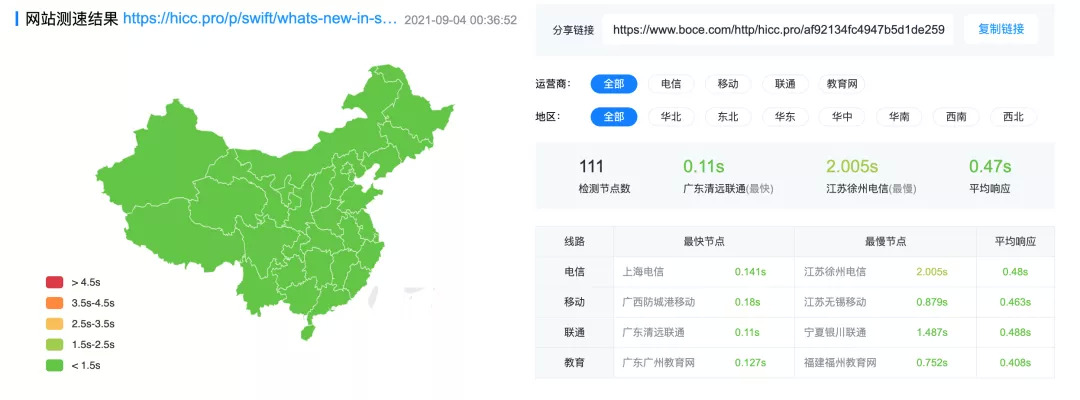Next.js酷在哪里?
之前使用 Next.js + strapi 做了一个简单博客站点也顺道写了一篇 Next.js 简明教程,之后 Next 本身一直在迅猛发展。利用代 js 能力来说做到了:
- 极佳的开发体验
- 极佳的网站最佳的”动“,“静”平衡
从特性上来说,支持:
- SSR(Server Side Rendering)
提供 getServerSideProps 方法,在用户访问时请求数据,适用于实时数据页面。 - SSG(Static Site Generation)
提供 getStaticProps,getStaticPaths 方法来预先生产静态页面;
而更酷的一点是:使用 fallback,revalidate 来支持一定的动态性。
这种能“动”的 SSG 自然是我所需要的,保持静态访问,而又能在我新增修改文章的时候,站点能够自动更新。绝佳!!
为什么还需要来Webify“折腾”一番?
既然上面已经很酷了,为什么会有今天的文章,为什么还需要折腾一番?
原因也很简单:成本略高,为了不错的访问速度,你需要一台性能不错的虚拟机,一定的带宽。对于一般个人博客,投入不划算。
在这里就隆重地有请我们的解决方案:腾讯云开发Webify,简单来说就是类似 vercel 的 Serverless 托管服务,不过支持更多的框架,而且是国内服务商,便宜且访问速度一流。
有图为证:

而且现在托管,能免费领300元无门槛代金券,香啊~感兴趣的可以点击下方链接了解一下:https://cloud.tencent.com/developer/article/1871549
CloudBase Webify实战
对于一般文章使用类似 github 管理的就简单了,Webify支持版本 Github、Gitlab、Gitee 服务商,听说即将支持 Coding:
- Vue.js (vue-cli)
- React.js (create-react-app)
- Hexo
- Gatsby.js
- Angular
- Next.js SSG
- Nuxt.js SSG
- 以及自动适配框架
以本博客 next 为例,Webify实际上使用时了 next export 的能力,构建后,直接部署静态文件到 server。
如果你的博客文章,直接使用 md,git 管理,看到这里就OK了,git 提交,Webify自动会重新部署你的站点。cool~~
问题是如果你的站点数据来源于类似 strapi 这种 serverless cms 怎么办?next export 不支持next SSG中“动”的特性(fallback,revalidate)。
Webify高阶——自动化Webify
其实方法也很简单,加一个桥接服务,让你的 serverless cms 的更新变动到 git 就好。
具体以 strapi 为例子:
- strapi 数据发布
- web hook到自定义的桥接服务。
- 桥接服务更新站点git。
- Weify触发重新部署。
当然如果后续 webify 支持更多的重新部署方式,这里会更简单一点。
这样乍看,似乎又回到了原点,我们还是需要一台服务器,这里又要引入本文的另一个嘉宾了,tcb 云函数。上述这种按需调用的服务,使用云函数最合适了,你不需要一个一直开机的虚拟机,你只需要在更新文章时候才需要唤起云函数就好,随用随停,成本低廉。
按照本博客的场景,我们让桥接服务在运行的时候,自动生成站点的 sitemap 到github来一举两得。
- 用来sitemap生成站点地图xml;
- 使用@octokit/rest,@octokit/plugin-create-or-update-text-file来更新github中文件。
下面是精简过的代码:
生成站点地图sitemap.xml
const {
SitemapStream,
streamToPromise
} = require('sitemap')
const {
Readable,
Transform,
pipeline
} = require('stream')
const {
apiRequest,
getPostsWithGraphql
} = require('./request')
const PaginationLimit = 30
module.exports = ({
hostname,
cmsUrl
}) => {
async function getPostSitemap() {
const smStream = new SitemapStream({
hostname,
});
let page = 0;
const postStream = new Readable({
objectMode: true,
async read(size) {
const result = await getPostsWithGraphql(`${cmsUrl}/graphql`, page++, PaginationLimit);
if (result.error || !Array.isArray(result.data.posts)) {
this.push(null);
} else {
result.data.posts.forEach((item) => {
this.push(item);
});
if (result.data.posts.length < PaginationLimit) {
this.push(null);
}
}
},
});
const trans = new Transform({
objectMode: true,
transform(data, encoding, callback) {
callback(null, {
url: `/p/${data.book.slug || data.book.uuid}/${
data.slug || data.uuid
}`,
changefreq: 'daily',
priority: 1,
lastmod: new Date(data.updated_at),
});
},
});
const buffer = await streamToPromise(pipeline(postStream, trans, smStream, (e) => {
// throw e;
}))
return {
path: 'public/sitemap.xml',
content: buffer.toString()
}
}
return Promise.all([
// getHomeSitemap(),
// getBookSitemap(),
getPostSitemap()
])
}
更新Github中文件
'use strict';
const {
Octokit
} = require("@octokit/rest");
const {
createOrUpdateTextFile,
} = require("@octokit/plugin-create-or-update-text-file");
const {
throttling
} = require("@octokit/plugin-throttling");
const getSitemaps = require('./sitemap')
const MyOctokit = Octokit.plugin(createOrUpdateTextFile, throttling);
exports.main = async (event, context) => {
const {
headers: {
authorization,
'x-strapi-event': strapiEvent
},
body
} = event;
const {
model,
entry
} = JSON.parse(body)
const {
CMS_TOKEN,
GITHUB_ACCESS_TOKEN,
BLOG_URL = 'https://hicc.pro',
CMS_URL = 'https://cms.hicc.pro'
} = process.env;
// strapi 上添加密钥来确保安全
if (CMS_TOKEN !== authorization) {
return {
doTrigger: false
}
}
let doTrigger = false // TODO: 识别真正的发布
const siteMaps = await getSitemaps({
hostname: BLOG_URL,
cmsUrl: CMS_URL
})
const octokit = new MyOctokit({
auth: GITHUB_ACCESS_TOKEN,
throttle: {
onRateLimit: (retryAfter, options) => {
console.warn(
`Request quota exhausted for request ${options.method} ${options.url}`
);
// Retry twice after hitting a rate limit error, then give up
if (options.request.retryCount <= 2) {
console.log(`Retrying after ${retryAfter} seconds!`);
return true;
}
},
onAbuseLimit: (retryAfter, options) => {
// does not retry, only logs a warning
console.warn(
`Abuse detected for request ${options.method} ${options.url}`
);
},
},
});
await Promise.all(siteMaps.map(({
path,
content
}) => {
return octokit.createOrUpdateTextFile({
// replace the owner and email with your own details
owner: "xxx",
repo: "xxx",
path,
message: `feat: update ${path} programatically`,
content: content,
branch: 'master',
sha: '',
committer: {
name: "xxx",
email: "xxxx@outlook.com",
},
author: {
name: "xxx",
email: "xxxx@outlook.com",
},
})
}))
return {
doTrigger
}
};
作者:hicc,腾讯高级前端开发工程师。
欢迎访问Webify官网:https://webify.cloudbase.net/
个人站点扶持计划,免费领300元无门槛代金券:https://webify.cloudbase.net/blog/personal-site-plan